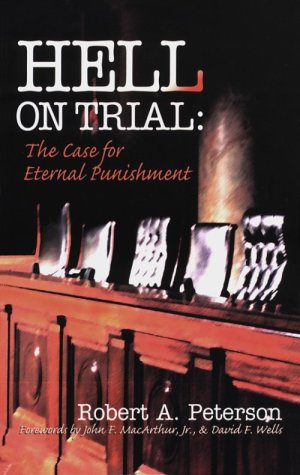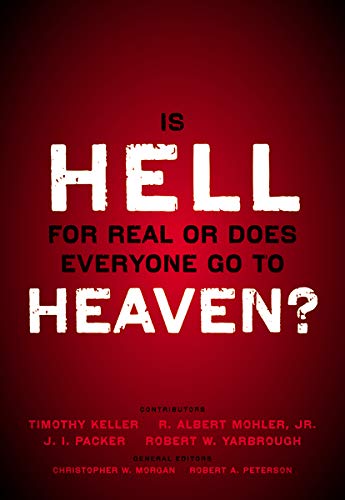Quotes about Hell-Identified
Let us not so much labor to know where hell is – as how to escape it.
A measure of our own ongoing sinfulness is that we just don’t understand the beauty of God’s holiness, righteousness, and justice and the equal ultimacy of these attributes with his love. But one day we will not have a problem with eternal punishment. It will make perfect sense. We are not entitled, much less required, in our present condition to defend the doctrine of eternal punishment in any way that either exceeds Scripture or reflects a perverse delight in damnation. Since God does not delight in the death of the wicked, neither can we.
Hell Is Not Separation from God, CCC Discover, Used by Permission, https://cccdiscover.com/hell-is-not-separation-from-god.
[Hell] is described as a second death, an unending death, a death of eternal conscious torment as finite creatures attempt for all eternity to pay an infinite debt against an infinite and holy God (Rev. 20:11-15).
Forsaken by Mark Dever and Michael Lawrence taken from It Is Well, by Mark Dever and Michael Lawrence, copyright 2010, Crossway Books, a division of Good News Publishers, Wheaton Illinois 60187, www.crosswaybooks.org, page 88.
[It is not] as though the ungodly see God and His appearance as the godly will see Him; but they will feel the power of His presence, which they will not be able to bear, and yet will be forced to bear.
Neither the devil nor his angels will torment people in hell. Satan and his demons will be among the tormented; they will not be tormentors (Revelation 20:10).
Taken from One Minute After You Die by Erwin Lutzer, Moody Publishers, 1997, p. 112. Get this book!
Hell will not be a place, as some jokingly envision, where the ungodly will continue to do their thing while the godly do theirs in heaven. Hell will have no friendships, no fellowship, no camaraderie, no comfort. It will not even have the debauched pleasures in which the ungodly love to revel on earth. There will be no pleasure in hell of any kind or degree – only torment, “day and night forever and ever” (Rev. 20:10).
When we preach about hell, then, to what are we referring? Well, if we are speaking about the place in which God has confined some of the fallen angels, then hell is Tartarus, a place to which human beings do not appear to be sent. But if we are speaking about the place to which souls of the unsaved are sent while their bodies await resurrection, then hell is Hades, and it is those passages which mention it that become our texts when warning unbelievers about the hell in which they will be confined immediately at death. However, there is, in addition, a dreadful day looming, following the judgment of the Great White Throne, when both the bodies and the souls of the unsaved shall be cast into a final destination called Gehenna, or the lake of fire.
Revelation 21 and 22 present heaven as the opposite of hell. Hell is separation from the gracious presence of God; heaven, living in that presence. Hell involves terrible pain; heaven, unceasing joy. Hell means the darkness of banishment from God’s glory; heaven, basking in its light. Hell consists of everlasting rejection by God; heaven, being His son or daughter forever. Hell entails the second death; heaven, eternal life.
Hell on Trial: The Case for Eternal Punishment, P&R Publishers, 1995, p. 220. Used by permission.
So the meaning of away from the presence of the Lord does not mean that God is absent in every sense, but in those senses [His love which produces His pleasures forevermore/fullness of joy]. God will be terribly present in another sense. All reality continues to say: In Him we live and move and have our being. And it is still in hell that no one can hide from the Lord or escape the terrible countenance of His anger. So God’s power is present in hell as the One who sustains our being and the One who enforces justice and the One who maintains suffering. He is present in all the ways men do not want Him to be present and none of the ways that believers enjoy His presence.
Used by permission of Desiring God Ministries, www.desiringgod.org/interviews/is-god-everywhere-and-absent-from-hell.
Will hell be everlasting? All the way back in the Old Testament, Daniel 12:2, “Many of those who sleep in the dust of the ground will awake, these to everlasting life, but the others to disgrace and everlasting contempt.” Matthew 25:46 “These will go away into eternal punishment, but the righteous into eternal life.” In this verses, the word translated “eternal” is the same one used for both heaven and hell. Heaven and hell parallel each other for eternity. They both stand or fall together. Jesus in Matthew 18:8 calls hell and “eternal fire.” Three times, Mark says of those in in hell, “Their worm will not die” (Mk. 9:44, 46, 48; cf. Isa. 66:24). When Jude speaks of false teachers in hell he says “for whom the black darkness has been reserved forever” (Jude 13). 2 Thessalonians 1:9, “These will pay the penalty of eternal destruction, away from the presence of the Lord and from the glory of His power.”
Scripture never challenges the concept that eternal punishment is by literal fire. Objections have to be on philosophic or theological grounds rather than on an exegetical one.














